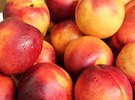Tridge, a global sourcing platform and market intelligence hub for food buyers and suppliers, have reported that the Spanish nectarines and Italian apricots are experiencing difficulties as a result of the Covid-19 pandemic.
20% decrease in Spanish nectarine yield
The harvest season for Spanish nectarines and peaches has started in the regions of Murcia, Catalonia, and Aragon, and is expected to finish late May. Spain shows a consistent export season from March to October, with the peak period between May and September.
 However, the yield for the Spanish nectarine market is projected to be 508 million kg, which is a 20% decrease in volume compared to last year. Suppliers are expecting a further decrease in harvest volume due to labor shortages from Covid-19. While Spain has not implemented any major restrictions, it is estimated that up to 40% of the workforce will be impacted as migrant workers from Morocco, Belarus, and Ukraine are not allowed to enter the country.
However, the yield for the Spanish nectarine market is projected to be 508 million kg, which is a 20% decrease in volume compared to last year. Suppliers are expecting a further decrease in harvest volume due to labor shortages from Covid-19. While Spain has not implemented any major restrictions, it is estimated that up to 40% of the workforce will be impacted as migrant workers from Morocco, Belarus, and Ukraine are not allowed to enter the country.
Spain is the biggest exporter of nectarines and peaches, with its main export markets including Germany, France, Italy, and the UK. With export volume totaling 829.4K tons in 2019, the demand for the fruits has increased by 23% this year. Yet, increased demand and labor shortages have seen the wholesale price of nectarines surge by up to 43%, which could soften the blow of the smaller harvest. For example, the white nectarine has increased from EUR 1.50 to EUR 2.13, while the yellow nectarine has increased from EUR 1.50 to EUR 2.15.
Frost hampers Italian apricot production
Italy is the second-biggest exporter of apricots, reaching an export volume of 56.3K tons in 2019. The expected production for 2020, however, has been hampered by frosts that occurred in late March and early April, with production in Northern Italy affected the most. The Northern Emilia Romagna region has seen the biggest estimated production decrease of almost 90% compared to last year.
The total Italian production volume for 2020 is expected to be 136K tons, a 56% decrease from approximately 307K tons in 2019. While suppliers have seen increases in demand from Central and Northern regions, there has been very little demand from the South. Apricot producers are also left with more obstacles to overcome as a decreased number of workers has left the farms with a shortage of labour to harvest the fruits.
Hoshik Shin, founder and CEO at Tridge, said: “While there are many external factors that can determine the success of a harvest season, normally the primary influencer is the weather. Unfortunately, some harvest seasons have been negatively impacted due to Covid-19, meaning that labor shortages are contributing to decreases in harvest levels. This means that low prices cannot be easily maintained”.
 For more information:
For more information:
Tridge
Email: [email protected]
www.tridge.com
